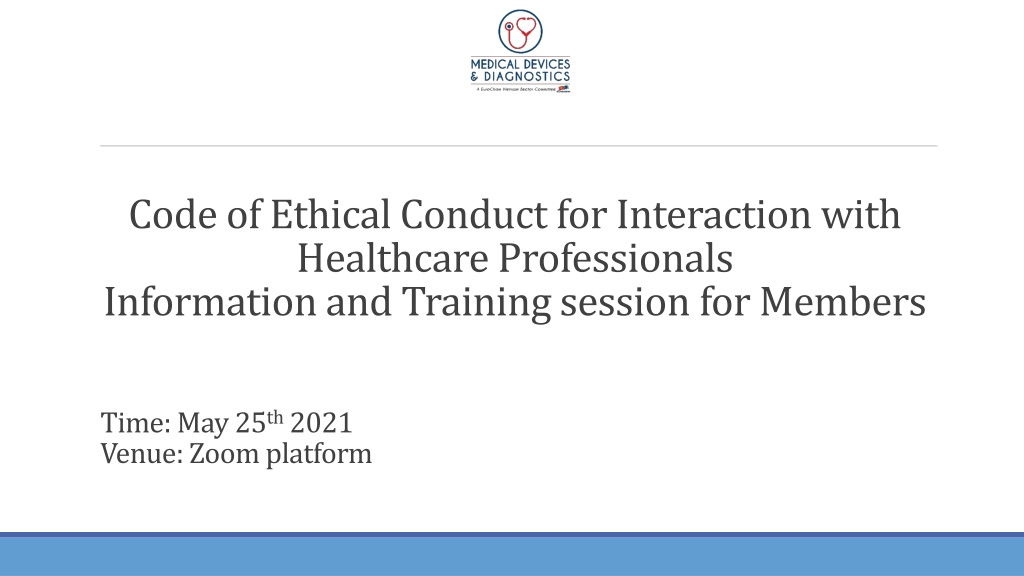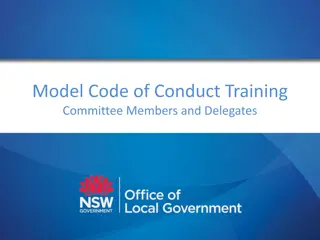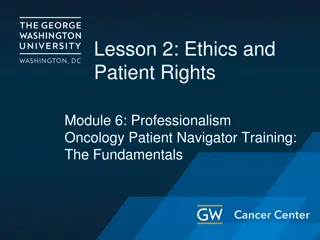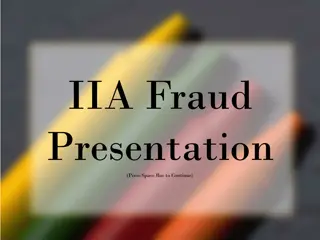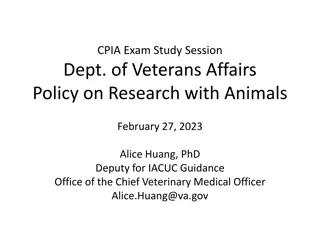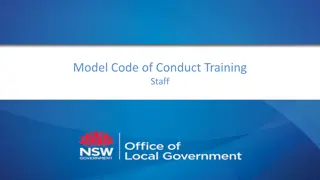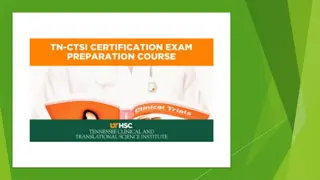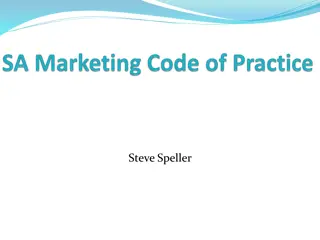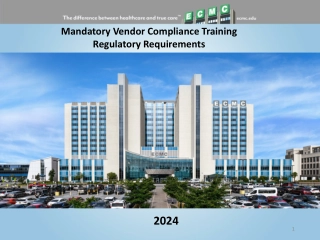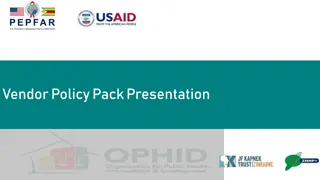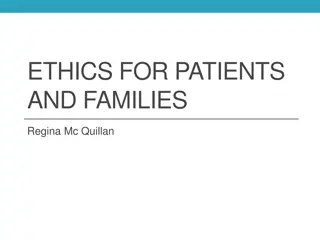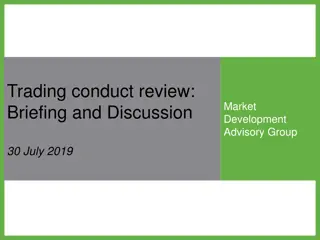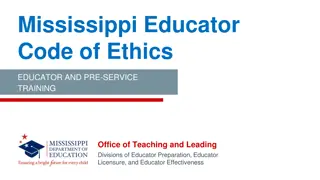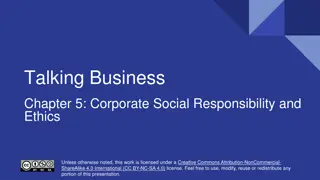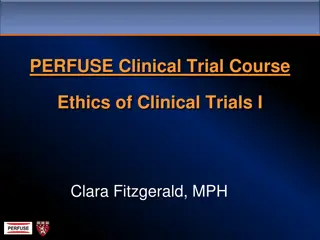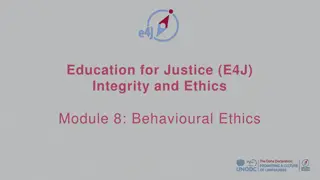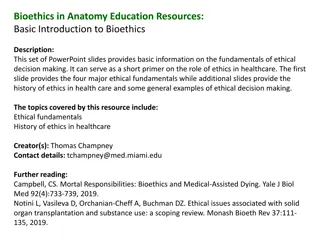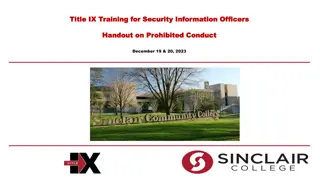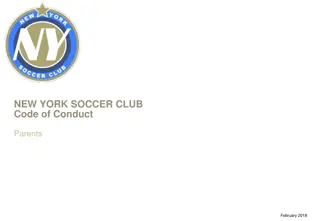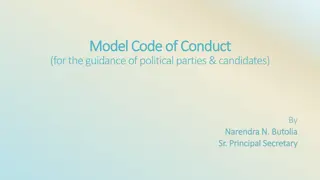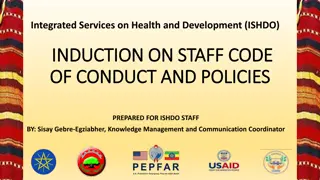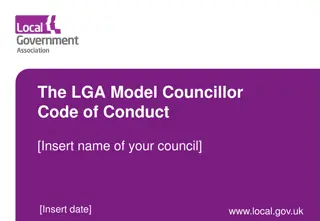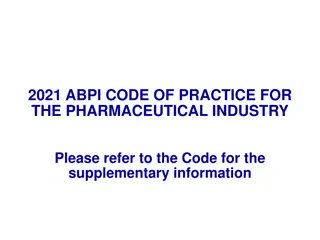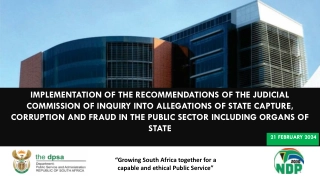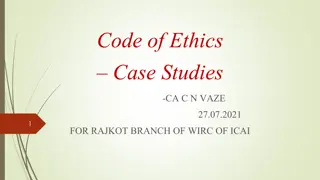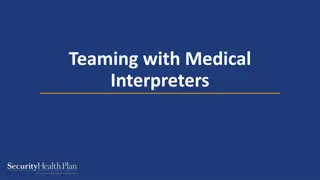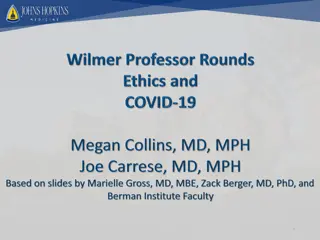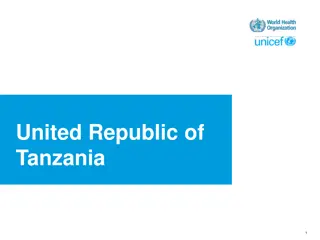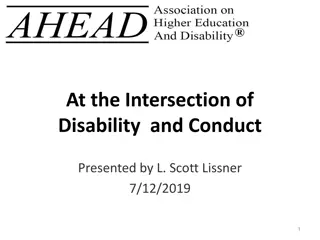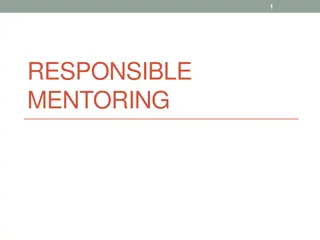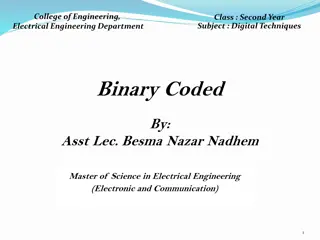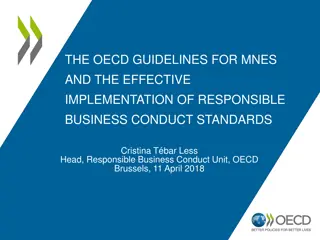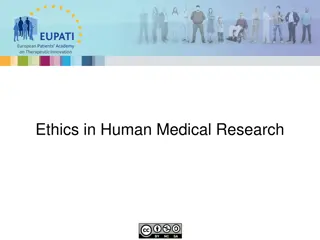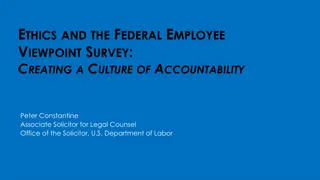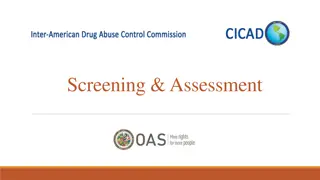Code of Ethical Conduct Training for Healthcare Professionals
Information and training session for members regarding the Code of Ethical Conduct for Interaction with Healthcare Professionals, including guidelines for participation and compliance with antitrust regulations and fair competition. The session covers key principles, updates on anti-corruption laws, and emphasizes ethical behavior in interactions with healthcare professionals. Attendees are required to follow specific protocols during the workshop to ensure active participation and receive certification.
Download Presentation

Please find below an Image/Link to download the presentation.
The content on the website is provided AS IS for your information and personal use only. It may not be sold, licensed, or shared on other websites without obtaining consent from the author. Download presentation by click this link. If you encounter any issues during the download, it is possible that the publisher has removed the file from their server.
E N D
Presentation Transcript
Code of Ethical Conduct for Interaction with Healthcare Professionals Information and Training session for Members Time: May 25th 2021 Venue: Zoom platform
Attendees 1. Access the online meeting with full name Company name I am working (eg: Nguyen Thi ABC ABC Company Limited) 2. Turn on the silent mode ( mute ), only open the talk mode (microphone) when asking a question or being invited to chat. 3. Take all time to participate in the workshop while the workshop is taking place to ensure full information of the workshop. 4. The participating company please send the list of attendees to the MDDSC secretariat to receive the certificate of attending the training. Respectfully yours.
Code of Ethical Conduct for Interaction with Healthcare Professionals Information and Training session for Members Opening speech Mr. Torben Minko, Chairman of EuroCham Medical Devices and Diagnostics Sector Committee
Agenda Welcome and Introduction Introduction on EuroCham MDDSC Code of Ethical Conduct Training: presented by MDDSC Business Ethics Working Group Introduction on the Code Key principles Update on the Anti-Corruption Law Q&A Conclusion
Declaration of compliance with antitrust regulations, and fair competition Attorney Le Bich Lien
Declaration of compliance with antitrust regulations, and fair competition Members of EuroCham Medical Devices and Diagnostics Sector Committee are not allowed to violate the law, or participate in the activities of EuroCham Sector Committees with the purpose of circumventing the law in general and Vietnamese and international laws on competition and/or monopoly in particular. EuroCham MDDSC members may hold meetings and discuss professional matters at meetings, provided that there is no specific and continuing purpose, understanding or consensus intended to limit action or bias free trade or violate any rules or regulations. Distributors of MDDSC members when working with healthcare professionals on a Member's medical device technology and/or diagnostic products, agree to abide by the law and general principles of ethics and conduct, legal regulations Vietnam as well as internationally on competition and/or antitrust in particular.
Code of Ethical Conduct for Interaction with Healthcare Professionals Information and Training session for Members Welcome and Introduction
Introduction on EuroCham MDDSC Medical Devices and Diagnostics Sector Committee (MDDSC): 1 of 16 Sector Committees of EuroCham Established in May 2016. Members represent the vast diversity of the industry. Mission: engage with governments, regulators, payers, healthcare providers, etc. to: advocate good practices promote high industry standards help develop policies Shape the future of healthcare in Vietnam Vision: enable timely access to sustainable, innovative and high quality healthcare for all citizens of Vietnam Management: Executive Board By Law was adopted on September 27th, 2018
Introduction on Members Compliance representatives Abbott Laboratories Abbott Vascular Alcon B.Braun Baxter Healthcare Bayer bioM rieux Vietnam Carl Zeiss DKSH Draeger Edwards Lifesciences ASIA Fresenius Medical Care Fujirebio GE Vietnam Johnson & Johnson KarlStorz Medtronic Olympus Medical Systems Philips Roche Diagnostics Siemens Healthineers Stryker Terumo Urgo Zuellig Pharma
Introduction Business Ethics Working Group MDDSC has 3 Working Groups work towards the goals of MDDSC: Regulatory Affairs , Market Access, and Business Ethics Business Ethics Working Group: active since July 2017 Objectives: Promote ethical and law-abiding business practices Raise awareness, capacity and apply best practice mechanisms to enhance compliance with the law Represent MDDSC to advise and works with relevant agencies on issues related to legal compliance Develop common policies to enhance compliance with the law Members of the Business Ethics Working Group: Representative of Compliance/Legal/Audit of MDDSC members Nominated by the General Managers of MDDSC members
Code of Ethical Conduct for Interaction with Healthcare Professionals Information and Training session for Members Code of Ethical Conduct Training
Introduction: Timeline 2 October 2019: The MDDSC Code of Conduct comes into effect, applicable to MDDSC members and their distributors in Vietnam.
Introduction: Contributors MDDSC Business Ethics Working Group Active role in drafting, developing the Code Clarify members questions MDDSC Board Provide strategic oversight, direction to the Code Approve final version of the Code MDDSC General Assembly: 23 members Feedback during the drafting process Provide inputs to the Code s revision Vote for adoption of final version of the Code APACMed Legal review for final version of the Code Key framework for the Code MDDSC Secretariat Coordinate activities of the Code
Introduction on COE: Objectives The purpose of this Code is to promote ethical interactions between MDDSC s corporate members that develop, manufacture, sell, market, or distribute medical devices and diagnostics technologies in Vietnam ("Members") and those individuals and entities that use, recommend, purchase, or prescribe medical devices and diagnostics technologies in Vietnam. This Code is subject to the laws of Vietnam, Member shall adhere to the more restrictive provision in the law or other codes of conduct. This Code is applicable to all MDDSC s members and its Third-party Intermediaries (including consultants, distributors, sales agents, and brokers).
POP QUIZ Are members and distributors allowed to give gifts to health workers? A. Allowed B. Not allowed
Key principles: Ref. Main contents Section 2.1.1 Controlling principle No gift directly or indirectly to a HCP (e.g. no gift for Tet, Mid- Autumn, Xmas ) No entertainment or recreation is allowed (e.g. theatre, sporting event, golf, skiing, hunting, leisure or vacation trips ) Cultural Gifts
Key principles: Ref. Sec 2.1.2 Main contents Event stationery Controlling principle Allowed with total value must not exceed VND 200,000 per HCP per event. Stationery (pen, notepad, document holder, USB, etc.) to help participants take notes, review material, or to take away the materials/hand-outs/related scientific materials form the event.
POP QUIZ Regarding Giveaways, what is the minimum value of the branded or non-branded items that we can provie HCPs? A. Not exceeding VND 1,000,000 per item B. Not exceeding VND 500,000 per item C. No limit D. Not exceeding VND 200,000 per item
Key principles: Ref. Main contents Sec 2.1.3 Give-aways (branded or non- branded items) Controlling principle May occasionally provide HCPs branded or non-branded items of minimum value not exceeding VND 200,000 per item. These items must serve a genuine educational function relating to the HCP s practice or otherwise benefit the patients. E.g. Branded pens, small notebooks, medical gloves, safety glasses, medical face masks, etc.
Key principles: Ref. Secti on 2.1.4 Contents Medical Utility/ Informa tional Item/ Educatio nal support items Controlling principle Medical Utility allowed if such items are at modest value, not offset routine business practice, are directly beneficial to enhancing the provision of medical service and in line with Vietnamese law. Examples E.g.: Educational or informational items : not permissible: tablet computers permissible medical utility items : inhalation devices (without an active ingredient) or devices intended to assist patients learn how to self-inject, and software or mobile apps (e.g. BMI calculator). E.g. Medical utility items: not permissible: stethoscopes, surgical gloves, blood pressure monitors, and needles. permissible educational or informational items: memory sticks pre-loaded with educational or informational data (if storage capacity is commensurate with materials provided), medical/scientific books/magazines, etc. Informational item and Educational support item allowed if such items are for educational purposes and do not have independent value Total value (all of these items) less than VND 8,000,000 per HCP per year and less than VND 2,000,000 per HCP per occasion. The Member must notify the HCP of their obligation to report items received.
Key principles: Ref. Section 2.2 Main contents Meals associated with HCP Business Interaction Controlling principle Allowed, provided that the meals are - Modest value - Legitimate business discussion/purpose - Appropriate location and venue - Not provide recreation/entertainment - Not pay for anyone accompanying an HCP to an event
POP QUIZ Which statement is TRUE? Sample/Demonstration products are . A. Products for survey purposes in the market B. Products that can be sold with a limit quantity C. Sample products must be clearly marked "Not for human use", "Sample goods", "Not for diagnostic purposes". D. Recorded by email exchange between supplier and health worker
Key principles: Ref. Main contents Controlling principle Sectio n 2.3 Sample/Demon stration products Evaluation/ * Evaluation products are used in patient care without any patient charge, include single use products (e.g., consumable or disposable products) and multiple use products (sometimes referred to as capital equipment ). For example, no more than 2 diagnostics reagent kits of the same kind per laboratory or HCO may be provided per year. * Sample/Demonstration products are solely for demonstration purposes and that they cannot be sold or used for human clinical studies or routine patient management. Allowed, provided that: - For evaluation and demonstration purposes - Not a mean of inappropriate inducement to purchase product - Appropriately documented and accounted - Reasonable quantities - Demonstration products should be marked not for human use , sample , or Not for diagnostic purposes
Key principles: Ref. Sectio n 2.4 Main contents Controlling principle Honoraria and Agreement for HCP s Scientific or Educational Services - - - Allowed, provided that: - It is directly in relation to legitimate services - The selection based on consultant s legitimate license, qualification, and expertise. The honorarium must be fair market value Payment by bank transfer to consultant s bank account. No cash payment The agreement/contract must be in writing specifying in detail the service and signed by both parties before the service provided. - Service provided in accordance to the signed agreement/contract. Member should design its own control process.
Key principles: Main contents Controlling principle Ref. Secti on 2.5 Member support of Third-party Educational events Allowed, provided that: - The third party educational event primary be dedicated to promoting medical, scientific and educational activities. - Decision to support must be based on sufficient information evaluate the medical, scientific and education purpose as well as the appropriateness of the venue & agenda. - Member should not seek to inappropriate influence the program content, selection of the faculty, educational methods or material at the third party event. - Not use as a mean to induce HCPs to use, recommend, purchase, or prescribe Members products and services Members may support the attendance of HCPs at Third Party Educational Events through provision of as Educational Grants (ref. section 2.7 of the Code) to: - The organizer of the Third party Educational event to defray the costs of running the event and/or to support attendance of HCPs at the event. - A Professional Association or Healthcare Institution to support attendance of HCPs at the third party educational event (decision on selection of HCP will be independently made by the recipient of the grant)
Key principles: Main contents Controlling principle Member support of Third-party Educational events Registration fees to the Third party Educational Event Reasonable travel to, and modest accommodation at, the Third party Educational Event where out- of-town travel is required Incidental meals and refreshment at modest value and are subordinate in time and focus to the educational purpose of the Third Party Educational Event. Members shall neither: Arrange, pay for, offer to pay for, or otherwise reimburse the expenses of any individual HCP to attend or speak at a Third Party Educational Event, nor Select, or influence the selection of, any HCP to attend a Third party Educational Event, whether as a delegate or faculty. Ref. Secti on 2.5 Members may support of third party educational event by providing funding to the above parties for the following purposes: Advertising and leasing of booth space to display and promotional activities at Third Party Educational Event Holding of satellite symposia at the Third party Educational Event
Key principles: Ref. Main contents Sect ion 2.6 Supported Medical Technology Training and Education Controlling principle Allowed, provided that: - Training and education organized by member with qualified resource to HCPs on member s product-specific technology deployment, use, and application to facilitate the safe and effective use of medical devices and diagnostics technologies (ref. member registered scope of business in Vietnam) - Training and education programs shall be conducted in appropriate venues - Reasonable cost of travel, accommodation, meals, and refreshment for HCPs attending Member Organized or/and Who can be a qualified resource for training? It may include member s personnel with appropriate technical expertise or personnel of an independent, reputable, professional third party. Example of appropriate venues The HCP s premises,the Member s premises, or other clinical, laboratory, educational, or conference training facilities (including hotel conference rooms), depending on the nature of the program. The venue must not be selected because of its entertainment, leisure, or recreational facilities The following are considered as inappropriate venues in general: Resorts, gaming locations (casinos); holiday resorts; leisure facilities, amusement park
Key principles: Contents Research and Educational Grant Note: new point comparing to other codes: No individual HCPs sponsorship; Ref. Secti on 2.7 Controlling principle Member may provide Research and Educational Grants provided that member: Adopts objective criteria for providing the grant Implement appropriate procedures to ensure that grants are not conditional on the use, recommendation, purchase, or prescription of the member s products and services; and Ensure that the recipient of the grant makes an independent decision on application of the grant and/or selection of any beneficiary of the grant. Research grant only be provided to support independent medical research with scientific merit or healthcare policy development, provided that such activities have well-defined objectives and milestones. Educational Grant only be provided to advance patient care, for medical education of medical student, fellows participating in fellowship program, or other medical personnel , or for educating the public on healthcare issues.
Key principles: Contents Controlling principle Research and Educational Grant Note: new point comparing to other codes: No individual HCPs sponsorship; the grant. Member may not assist in any logistic arrangement for such request Grants shall be documented in a legal agreement between the member and the event organizer/Healthcare Institution/Professional Association Educational grant shall be made by bank transfer to the bank account of Event Organizer/Healthcare Institution/Professional Association Ref. Secti on 2.7 Reference to section 2.5, Member may support Third Party Educational Events by providing Educational Grants to: - The organizer of the Third party Educational event to defray the costs of running the event and/or to support attendance of HCPs at the event. - A Professional Association or Healthcare Institution to support attendance of HCPs at the third party educational event With conditions: Official written request from a recognized Event organizer, HCO, professional association, not from any individual. Member shall not issue any invitation Member shall ensure that the grant provided is legitimate and at fair market value Member ensure no influence, the decision on the selection of HCP will be independently made by the recipient of
POP QUIZ Does one s company allowed to use charitable donation for marketing purposes? A. Yes B. No
Key principles: Main contents Section 2.8 Donation Ref. Controlling principle Allowed, provided that the donation is: - Made for charitable purposes only to bona fide non-profit entities and charitable organization as determined by Vietnamese law. - Not to be used as a marketing tool - Not made based on the recommendation of any HCP and/or Government officials. - Not given directly to individual - Shall be appropriately documented Charitable * Bona fide non-profit entities: Non-profit organisations are legal entities or organisations with main operation being mobilisation or distribution of funds for charitable, religious, cultural, educational and social purposes or similar purposes, but not for profits, include: foreign non-governmental organisations, social funds, charity funds established and operate in accordance with Vietnamese laws.
Key principles: Main contents Section 2.9 Ref. Controlling principle Market Research Can be Initiated and intended to answer legitimate scientific questions about the efficacy, safety, efficiency or utilization of products, or otherwise to advance the science in members therapy areas. Must not use as a means to promote products/therapies, or to reward individuals or organization. Must be conducted consistent with applicable regulations in Vietnam Must be presented in high ethical standard, in compliance with latest approved product information and Vietnamese laws and regulations. Market research Section 2.10 Product information
Key principles: Main contents Section 3 Commitment Section 4 Section 5 in doing business Ref. Controlling principle Compliance with the quality and safety standards prescribed by the relevant applicable Vietnamese laws and regulations Member to ensure the trade promotion to be in line with applicable laws and must not be misused as a means of improper inducement. Product Quality Trade Promotion Competition must be implemented in the principles of compliance with Vietnam law, honesty, fairness and non-infringement upon legitimate rights and interest of other companies and consumers Members are responsible for - Oversight of the members compliance with this Code - Effective communication of the Code to its employees, contractors and third party intermediaries Fair Competition Section 6 Trainings
POP QUIZ When there is a complaint about the implementation of the Code, who should the company contact? A. MDDSC Secretariat via mddsc@eurochamvn.org B. Ministry of Health C. Office of Government
Handling complaints procedure: Complaint submission: Member companies file an official complaint in writing to EuroCham MDDSC Secretariat, who submit the complaint to EuroCham appointed Board member Complaint processing: EuroCham appointed Board member and the Business Ethics Working Group review, consider, determine whether a breach of the Code has occurred Conflicts of interest to be considered Law firm/audit firm be involved if necessary Ask for official information back from the company compliance representative and its General Manager Complaint handling decision: EuroCham appointed Board member and the MDDSC Chair/ MDDSC authorized Board member make final decision, including the types of sanctions Actions taken against Member in breach by MDDSC Board, such as: Request the Member to issue a written undertaking to discontinue the practice complained Suspend the membership of the Member for no more than 3 years
Relevant Vietnam Regulations Anti-Corruption Law Crimes of corruption in the Criminal Law Attorney Le Bich Lien
1. Applicable regulation - Penal Code No. 100/2015/QH13, as amended and supplemented by Law No. 12/2017/QH14 ( the Penal Code ); - Law on Anti-Corruption No. 36/2018/QH14 ( Law on Anticorruption ); - Decree 59/2019/ND-CP guiding the Anticorruption Law ( Decree 59 ); - Resolution 03/2020/NQ-HDTP guiding the application of the provisions of the Penal Code in the trial of corruption crimes and other crimes related to position; - Other relevant manuals.
2. Applicable subjects Persons holding positions and powers in (i) state agencies, organizations and units and (ii) non-state sector enterprises and organizations, including: Officials and civil servants; Officers, professional soldiers, workers, defense officers; officers, employees, officers, belonging to the people's police unit; Representative of the state capital in the enterprise; Holders of managerial titles or positions in enterprises or organizations; Other persons assigned to perform tasks or official duties and have powers while performing such tasks or official duties.
3. Regulations on receiving gifts - Agencies, organizations, units, people with positions and powers are not allowed to receive gifts in any form from individuals, agencies, organizations and units related to the work they handle or fall under the jurisdiction of the Government. micro management. - In case of cannot refuse, it must be handled according to regulations.
3. Regulations on gifts Gifts in money, valuable papers; Gifts in kind; Gifts are services of sightseeing, tourism, health care, education - training, internship, fostering at home or abroad, other services; Gifts are animals, plants, fresh and live foods and other artifacts that are difficult to preserve.
3. Regulations on gift handling - Report and return gifts: in case one cannot refuse, they must return them to the responsible department, report to the head of the unit or their immediate superior, and return the gift for handling within 5 days. - Handling: submit to the budget, organize a public auction; gifts are not allowed to be used as a service; for live animals and plants, and artifacts that are difficult to preserve, they shall be handled as if they were material evidences of administrative violations.
4. Handling violations of gift giving/receiving According to the Anti-Corruption Law: Government sector Non-state sector Disciplinary action against cadres, civil servants and public employees and sanction administrative violations in the field of management and use of state property. No regulations, depending on the ethical rules and regulations of each organization or enterprise for violations.
4. Criminal violations related to gift giving/receiving - According to the Penal Code: Applicable to all subjects, regardless of which individual works at which agency, organization or enterprise. Amount of corruption Bribetaker The bribe-giver Bribery broker i) Money, property or other material benefits valued at between VND 2 million and under VND 100 million; and ii) Non-material benefits Imprisonment from 02 years to 07 years A fine ranging from VND 20 million to VND 200 million; Non-custodial reform for up to 3 years; or Imprisonment from 6 months to 3 years A fine of between VND 20 million and under VND 200 million; Non-custodial reform for up to 3 years; or Imprisonment from 6 months to 3 years Money, property or other material benefits valued at between VND 100 million and under VND 500 million Imprisonment from 07 years to 15 years Imprisonment from 02 years to 07 years Imprisonment from 02 years to 07 years
4. Criminal violations related to gift giving/receiving - According to the Penal Code (cont.) Amount of corruption Bribetaker The bribe-giver Bribery broker Money, property or other material benefits valued at between VND 500 million and under VND 1 billion Imprisonment from 15 years to 20 years Imprisonment from 07 years to 12 years Imprisonment from 5 years to 10 years Money, property or other material benefits valued at VND 1 billion or more Imprisonment 20 years, life imprisonment or death penalty Imprisonment from 12 years to 20 years Imprisonment from 08 years to 15 years
5. Risks/Legal Consequences Violating anti-corruption and anti-bribery laws/regulations of the European Communities, UK, USA... Subject to special inspection, investigation and supervision by competent agencies; Related activities are affected or stopped; The money obtained/related to illicit interests is confiscated; Expenses for legal procedures and related costs; Individuals involved: facing custody, detention, investigation, fines, imprisonment; Reputation, reputation, brand
Code of Ethical Conduct for Interaction with Healthcare Professionals Information and Training session for Members Q&A
Common Q&A 1. Is this Code aligned with the Vietnamese laws/APACMed Code? This Code is subject to the laws of Vietnam. If a provision in law is more restrictive than the corresponding provision in this Code, the Member shall adhere to the more restrictive provision in the law. This Code is in line with APACMed Code, legal reviewed by APACMed
Common Q&A 2. Governing scope: (i) Is this Code applied for companies business activities outside of EuroCham and/or all Eurocham members? This Code is applied for all EuroCham MDDSC Members business activities in Vietnam including members third party intermediaries (including consultants, distributors, sales agents, and brokers). (ii) If company has its own global policy on HCP interactions, here and there, there may be a duplicate/ differences between this Code and the company s policies. In case of difference between this Code and internal policies and the company have to follow their own policies, does this affects somehow to their positions within MDDSC? According to Section B of the Code, the more stringent rules shall be applied.
Common Q&A 3. Cultural gifts: (i) Is it also applied for giving gift in some major festive events of Vietnam which are considered as Vietnam official cultural events such as Tet Holiday, New Year s Eve, Christmas and Mid-Autumn? According to provision 2.1.1. under Section D of the Code, no cultural gift is allowed for any occasion. No more of such above cultural gifts is considered for HCPs. No exception to be granted. (ii) What if another company violates this provision, can any action be taken? According to provision 7.2. under Section D of the Code, Member companies could file an official complaint in writing stating the identity of the company, reference material against Member in breach to the MDDSC Secretariat. Following the complaint handling process and decision, MDDSC Board can take actions against the Member in breach.
